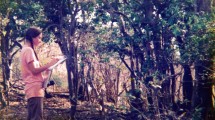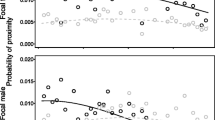Abstract
Four-year-old laboratory-born rhesus monkeys that had been reared in a nuclear family social environment consisting of mothers, fathers, siblings, peers, and other adults of both sexes were permitted to interact in various combinations with equal-aged monkeys that had been reared in an environment consisting of only mothers and peers. It was found that in most interaction sessions nuclear family subjects exhibited significantly higher levels of dominance and activity behaviors and significantly lower levels of submissive and passive behaviors than the mother-peer-reared subjects. These differences were not evident when subjects were tested within their own rearing groups. The significance of the results with respect to previous and future studies of social development in differential social environments is discussed.
Similar content being viewed by others
References
Alexander, B. K., 1966. The effects of early peer-deprivation on juvenile behavior of rhesus monkeys. Unpublished doctoral dissertation, University of Wisconsin.
Arling, G. L. &H. F. Harlow, 1967. Effects of social deprivation on the maternal behavior of rhesus monkeys.J. comp. physiol. Psychol. 64: 371–377.
Clark, D. L., 1968. Immediate and delayed effects of early, intermediate, and late social isolation in the rhesus monkey. Unpublished doctoral dissertation, University of Wisconsin.
Gluck, J. P. &H. F. Harlow, 1971. The effects of deprived and enriched rearing conditions on later learning: A review. In:Cognitive Processes of Nonhuman Primates L. E. Jarrard (ed.), Academic Press, New York, pp. 103–119.
Hansen, E. W., 1966. The development of maternal and infant behavior in the rhesus monkey.Behaviour 27: 107–149.
Harlow, H. F., R. O. Dodsworth, &M. K. Harlow, 1965. Total social isolation in monkeys.Proc. Nat. Acad. Sci. 54: 90–96.
——, 1965. The affectional systems. In:Behavior of Nonhuman Primates, Vol. II,A. M. Schrier, H. F. Harlow, &F. Stollnitz (eds.), Academic Press, New York, pp. 287–334.
——, 1969. Effects of various mother-infant relationships on rhesus monkey behaviors. In:Determinants of Infant Behaviour, Vol. IV,B. M. Foss (ed.), Methuen, London, pp. 15–36.
——, 1971. From thought to therapy: Lessons from a primate laboratory.American Scientist 59: 538–549.
——, 1970. The nature of love—simplified.American Psychologist 25: 161–168.
Harlow, M. K., 1971. Nuclear family apparatus.Behav. Res. Meth. Instru. 3: 301–304.
Hinde, R. A. &Y. Spencer-Booth, 1971. Effects of brief separations from mother on rhesus monkeys.Science 173: 111–118.
Mitchell, G. D., E. J. Raymond, G. C. Ruppenthal, &H. F. Harlow, 1966. Long-term effects of total social isolation upon behavior of rhesus monkeys.Psychol. Rep. 18: 567–580.
Pratt, C. L., 1969. The developmental consequences of variations in early social stimulation. Unpublished doctoral dissertation, University of Wisconsin.
Rosenblum, L. A., 1961. The development of social behavior in the rhesus monkey. Unpublished doctoral dissertation, University of Wisconsin.
Rowland, G. L., 1964. The effects of total social isolation upon learning and social behavior of rhesus monkeys. Unpublished doctoral dissertation, University of Wisconsin.
Sackett, G. P., 1972. Isolation rearing in monkeys: Diffuse and specific effects on later behavior. In:Models Animaux du Comportement Human, Editions du Centre National de la Recherche Scientifique, No. 198, Paris, pp. 60–110.
Senko, M. G., 1966. The effects of early, intermediate, and late isolation upon adult macaque sexual behavior. Unpublished M. A. thesis, University of Wisconsin.
Suomi, S. J., 1972. Social development of rhesus monkeys reared in an enriched laboratory environment. Paper presented at the 20th International Congress of Psychology, Tokyo.
——, 1973. Social preferences of monkeys reared in an enriched laboratory environment.Child Development 44: 451–460.
——, 1971. Abnormal behavior in young monkeys. In:The Exceptional Infant, Vol. II,J. Hellmuth (ed.), Brunner/Mazel, New York, pp. 483–529.
——, 1970. Effect of repetitive infant-infant separation of young monkeys.J. Abnormal Psychol. 76: 161–172.
——, 1971. Behavioral effects of prolonged partial social isolation in the rhesus monkey.Psychol. Rep. 29: 1171–1177.
Author information
Authors and Affiliations
Additional information
This research was supported by grant No. MH-11894 from the National Institute of Mental Health to the University of Wisconsin Primate Laboratory, by the Grant Foundation, and by grant No. RR-0167 from the National Institutes of Health to the University of Wisconsin Primate Research Center.
About this article
Cite this article
Suomi, S.J. Social interactions of monkeys reared in a nuclear family environment versus monkeys reared with mothers and peers. Primates 15, 311–320 (1974). https://doi.org/10.1007/BF01791668
Received:
Accepted:
Issue Date:
DOI: https://doi.org/10.1007/BF01791668




